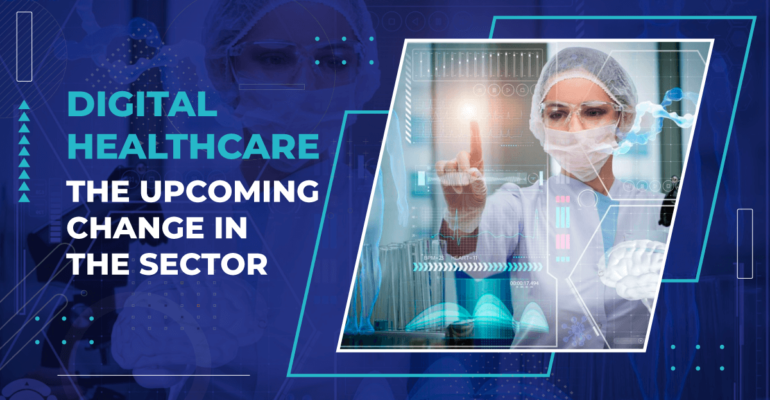Digital Healthcare I The upcoming change in the sector
August 4, 2021 2024-03-07 13:09Digital Healthcare I The upcoming change in the sector
In this blog, we will discuss how digital healthcare will transform the healthcare sector in the coming days.
Table of content:
- Introduction
- Current State of Digital Healthcare
- How to Transform Digital Healthcare
- Interoporability
- Healthcare System For You
- Data Governance
- Predictive Analysis
- The Future of Your Healthcare Provider
- The Bottom Line
Technology today has a significant impact on the quality of healthcare services provided. In all sectors, technology has been able to make the provision of services more accessible than ever.
For example, deciding on what to buy from retail centers is more convenient now. With the use of digital stores, you can choose which of the available items suits you. This level of accessibility relates to most of the other sectors.
The provision of healthcare is more complicated than that. We can say the amount of technology needed to complete a seamless digital healthcare system has not been obtained yet. However, significant strides are visible today.
Current State of Digital Healthcare
Today, the state of digital healthcare faces a lot of setbacks. What modern technology can do is to help the health provider in selected areas. Sadly, not in its entirety yet. The reason for this is that healthcare services are person-enabled services. It is a specialty service where human decisions are essential to access the condition of the person receiving the service.
Personnel in healthcare spend almost a decade in training to receive their first medical licenses. Their job duties focus specifically on a patient’s diagnosis. Even when cases are the same and need the same treatment, there can be one factor that changes the treatment.
Humans are different in diverse ways. So, anything that is detrimental to our health is handled with intense care. This does not mean that your healthcare provider does not rely on technology to execute duties.
Doctors and nurses use stacked-up data on modern devices to help in their decision-making. We wear smartwatches that can alert us to unusual BPM’s as it stores heart rate data. All of which is useful information a healthcare provider would use for personal diagnosis.
How to Transform Digital Healthcare
There are some elements of healthcare that need to gain notable change before it transforms. With their evolution, these elements can influence the transformation. Here are some aspects of healthcare listed below:
Interoperability
Currently, some health care institutions have started an interoperable system within. It would take some time for most institutions to be able to pull this off. When that is successful, the next phase of interoperability is trading data between hospitals.
The accessibility of data by verified health personnel could also display the data in advanced analytics. These analytics can provide insightful data on what may or may not work for a patient. For example, after previous treatment, information sent to a specialist would show how to start. The best decisions beneficial to one’s health would come out of this system.
So, patients can choose between hospitals based on their choice of time and location. This aspect of choice would be fundamental to the growth of digital health. It unlocks the tools needed for the personalization of health services. A simple decision such as choosing your healthcare provider is seamless with interoperability.
Healthcare System For You
Healthcare is not entirely person-enabled today. We get health services at the convenience of the healthcare provider. Even though we are used to customizing other services to fit us best, health services differ. This is not so beneficial when managing chronic illness.
The limitations in the livelihoods make it hard to receive healthcare when it is not personalized. For example, some may not access healthcare due to work schedules. This places the worker in a position of missing out on needed treatment. Thus, it is an important aspect that needs to change. Because, when healthcare becomes convenient for people, digital health can advance.
Data Governance
To go digital means to ensure that personal data is secure. For such a feat, there should be substantial investment in data governance. The growth of data assets due to technology makes it vulnerable to cyberattacks. People may try to steal personal information from client data. Some of the data at risk include addresses, passwords, social security numbers, and even debit card details.
By going fully digital, ultimate security levels would assure patients when sharing their data with health institutions. The governing body makes it accessible by only those providing health services. For healthcare, data governance teams can learn degree and diploma courses from Lincoln University.
Predictive Analysis
When there is secure data, it can be available to determine patterns of health problems. This may range from health by population, gender, location, income, and even tribe. Currently, individual analysis for disease takes up a lot of time. Chronic illnesses take not only time but a lot of money in the treatment, care, and recovery process.
However, when analytics develops, it would be easy to point out which persons are more at risk. This cuts out time for both institutions and patients. With predictive analysis, the decisions of healthcare UAE can be more accurate and feasible for going digital.
The Future of Your Healthcare Provider
The expected possibilities of digital healthcare look bright. Currently, the new development of 5G is accessible in a few locations. It performs 100 times faster than the current speeds we experience with 4G technology. 5G is expected to take all sectors to higher levels of productivity. Such productivity involves peak convenience for both service providers and consumers.
With such enormous speeds, the future of healthcare will depend on devices built to take advantage of 5G. So, it would take high availability of 5g in most areas before digital healthcare can reach optimum levels.
The Bottom Line
Although today’s technology plays a significant role in healthcare services, it does not meet other sectors’ levels. However, the possibilities are astonishing with the launch of 5G in a few cities. It would take 5G speeds to be commonly available before healthcare UAE gets close to being entirely virtual.
On the other hand, other elements of healthcare need to develop to set the virtual service in motion. They include interoperability, governance, predictive analysis, and person-based health services. Altogether, these elements would combine with the technologies developed on 5G speeds to bring efficient health services.
Implementing these technologies needs more human resources. And the healthcare sector is continuously seeking more abled professionals. You can also join this sector with an MBA in Healthcare Management degree. Check out the programs offered by LUBM. These affordable and flexible courses will help you enter this sector with enough skills and confidence. Visit our page today or connect with us WhatsApp.






